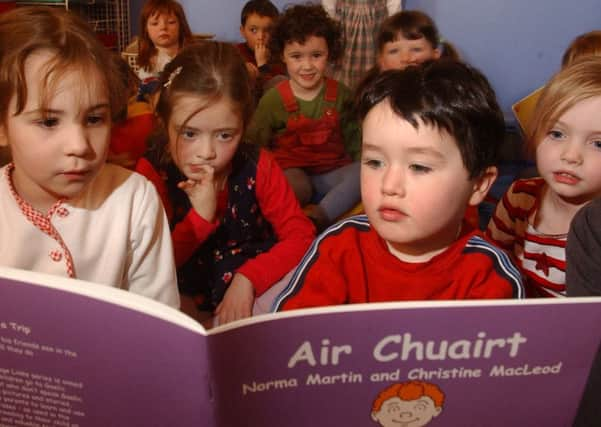Council's plan aims to ensure language thrives in 21st century and beyond


Whatever your feelings, no one can deny the Scottish Government is keeping it firmly front and centre in the national consciousness, making it a legal requirement for all local authorities in the country to create a plan outlining how they will support and increase Gaelic language culture in their area.
At a meeting of Falkirk Council’s executive committee on Tuesday members gave their backing to the local authority’s draft Gaelic Language Plan.
Advertisement
Hide AdAdvertisement
Hide AdCouncil leader Cecil Meiklejohn said: “It’s very important our young people learn about our local history and our local heritage. Gaelic is not just a North of Scotland or Western Isles language – it was used in the Central Lowlands as well.
“There is an increase in interest in the Gaelic and it’s not just about language. It’s the whole culture as well and it’s something we should encourage where we can.”
The council has already put forward a number of initiatives to raise the profile of Gaelic – including offering Gaelic awareness training to all staff.
The Royal National Mod, Gaelic’s annual festival of literature, song, arts and culture, took place in Falkirk in 2008 and Councillor Robert Spears hopes it will be back.
Advertisement
Hide AdAdvertisement
Hide AdHe said: “We had the Mod here and it brought a great deal of interest so it would be great if we could encourage them to come back to Falkirk.”
Leaning towards the ‘Gaelic is a dead language’ camp, Councillor Alan Nimmo asked how many school pupils were in the Falkirk Council area and was informed it was around 21,000. He then asked how many of them were currently studying Gaelic and was told there were 17 – that’s 0.08 percent of pupils in the area.
Councillor David Alexander was not impressed by Mr Nimmo’s attitude – or his mispronunciation of the word Gaelic, pronouncing it ‘gay-lik’ rather than the Scottish ‘gaa-lik’.
Mr Alexander said: “There is a whole history to the Gaelic language – it’s not so long ago this area spoke Gaelic and, if that is not something worth fighting for, worth saving, then there really is no hope for the future.
Advertisement
Hide AdAdvertisement
Hide Ad“I cannot think of any other country in the world that would allow a native language to die in this way and I find it really quite sad. The strategy itself is a good one. The young people are the future of the language and there is a recognition the language will continue to grow.”
At the moment annual travel costs for Falkirk Council pupils to attend Gaelic Medium Education in North Lanarkshire and Stirling costs £38,000, with the council receiving a Gaelic grant of £14,000 per year from the Scottish Government and the remaining £24,000 paid through the authority’s own funds.
A finalised plan must be submitted to Bòrd na Gàidhlig – the executive non-departmental public body of the Scottish Government responsible for Gaelic – no later than March 5.